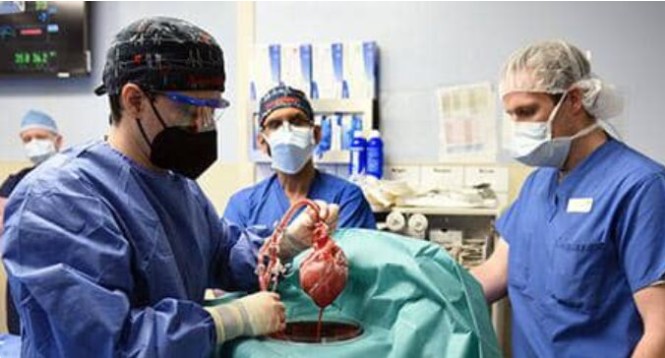David Bennett, a 57-year-old patient with terminal heart disease, has undergone a successful transplant of a genetically-modified pig’s heart — the first-operation-of-its-kind.
According to a statement issued on Monday by the University of Maryland School of Medicine (UMSOM), the historic surgery was conducted on Friday.
The organ transplant was reportedly the only available option for the patient who was said to be suffering from life-threatening arrhythmia — a condition where the heart beats with an irregular pattern.
Bennett was said to have been hospitalised and bed-ridden for months and connected to a heart-lung bypass machine to remain alive.
He had reportedly been deemed ineligible for a conventional heart transplant at the University of Maryland Medical Center (UMMC) and other leading transplant centres that reviewed his medical records.
“It was either die or do this transplant. I want to live. I know it’s a shot in the dark, but it’s my last choice. I look forward to getting out of bed after I recover.” Bennett had reportedly said before the surgery.
The US Food and Drug Administration granted emergency authorisation for the surgery on December 31, 2021, through its expanded access (compassionate use) provision in the hope of saving the patient’s life.
Commenting on the surgery, Bartley Griffith, director of the cardiac transplant programme at the medical centre, who performed the operation, said the “breakthrough surgery brings us one step closer to solving the organ shortage crisis”.
“There are simply not enough donor human hearts available to meet the long list of potential recipients,” he was quoted as saying.
“We are proceeding cautiously, but we are also optimistic that this first-in-the-world surgery will provide an important new option for patients in the future.”
On his part, Muhammad Mohiuddin, professor of surgery at UMSOM who established the cardiac xenotransplantation programme with Griffith, said the procedure will offer benefits for addressing heart disease.
“This is the culmination of years of highly complicated research to hone this technique in animals with survival times that have reached beyond nine months,” he was quoted as saying.
“The FDA used our data and data on the experimental pig to authorize the transplant in an end-stage heart disease patient who had no other treatment options.
“The successful procedure provided valuable information to help the medical community improve this potentially life-saving method in future patients.”
Bennett will be monitored over the coming weeks to determine whether the transplant provides lifesaving benefits.
His doctors also said he could be taken off the machine on Tuesday, since the first 48 hours, said to be critical, have passed without an incident.







